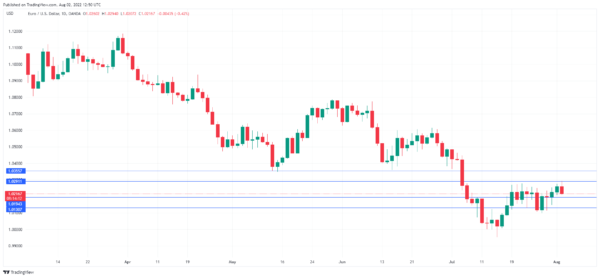The euro is in negative territory today. EUR/USD is trading at 1.0207, down 0.51% on the day.
Will weak German data weigh on euro?
Germany, the largest economy in the eurozone, is showing signs of weakness, which bodes badly for the rest of the eurozone as well as the euro. The week started off with soft manufacturing PMI and retail sales numbers out of Germany.
Retail sales for June posted a sharp decline of 1.6% MoM, down from the 1.2% gain in May and shy of the 0.2% estimate. On an annualized basis, retail sales fell a massive 8.8%, after a 1.1% gain in May, and worse than the forecast of -8.0%. The German consumer is in a surly mood due to the cost of living crisis and is holding tight onto her purse strings. If consumer weakness remains weak, the danger of a recession will only grow. As well, Germany’s Manufacturing PMI for July fell to 49.3, down from 52.0 in June. This is the first time in over two years that Germany’s manufacturing sector has recorded a decline, which is bound to worry the markets.
Manufacturing across Europe is struggling, as demand has fallen after the post-Covid surge. High inflation and the uncertain economic outlook, are additional headwinds for manufacturing, which could continue to post declines in the coming months if the eurozone economy doesn’t improve. The war in Ukraine remains a stalemate and has caused a huge rise in wheat and oil prices, resulting in spiralling inflation worldwide, including the eurozone. Russia has cut back on energy imports in response to Western sanctions and this could result in an energy crisis in Europe this winter. The Nord Stream 1 pipeline, a major conduit of natural gas from Russia to Europe, is operating at just 20% of capacity and there are fears that Moscow will not hesitate to weaponise its energy exports against Western Europe.
EUR/USD Technical
- There is resistance at 1.0291 and 1.0355
- 1.0194 is under pressure in support. Below, there is support at 1.0130

